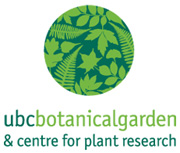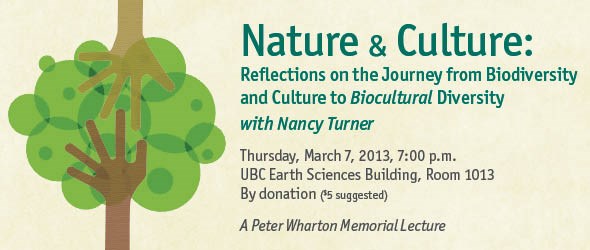 |
UBC Botanical Garden is Canada's oldest continuously operating university botanical garden. The original mission of the garden was research into the native flora of British Columbia. Over the past nine decades, our mission has broadened to include research, conservation, teaching and public display of temperate plants from around the world, particularly Asian, alpine and native plants. We’re also home to the Greenheart Canopy Walkway.Come visit us - we’re located at 6804 SW Marine Drive, Vancouver, BC. You can find more info at botanicalgarden.ubc.ca |
Thursday, March 7, 2013 | 7:00 p.m.
UBC Earth Sciences Building, Room 1013 (2207 Main Mall, Vancouver)
By donation ($5 suggested)
RSVP here (Space is limited, RSVP early to avoid disappointment.)
Predominant in western thinking, at least for the past few centuries, is the dichotomy between “nature” and “culture”, with humans seen to be above and dominant over nature. This perception, leading to particular behaviours and assumptions of those who adhere to it, it can be argued, has resulted in increasing degradation of natural systems, and an escalating loss of biodiversity the world over.
What is less recognized is that not all human cultures embrace this philosophy. For many Indigenous societies, for example, there is a predominant belief that humans are part of nature, close relatives of other species, and that not only do we depend on these other species, but we have responsibilities towards them as we do to our own kin.
This leads to a different kind of relationship with the natural world, and may give us clues about more sustainable ways of interacting with nature. However, these cultures with alternative views of the human-nature relationship are themselves widely threatened, and their knowledge and perspectives are being overrun by those of mainstream societies. Nevertheless, increasingly we are realizing that these differing cultural perspectives may be critically important in providing us with alternative models of relationships with other species and environments.
Nancy Turner explores why thinking of the importance not only of biodiversity but of biocultural diversity can help us to frame our attitudes, our governance systems, and our very understandings of what it is to be human, and may help us to become responsible players in the world’s ecosystems.
About the Speaker
Nancy Turner is an ethnobotanist, Distinguished Professor and Hakai Professor in Ethnoecology in the School of Environmental Studies, University of Victoria. She has worked with First Nations’ elders and cultural specialists in northwestern North America for over 40 years documenting and promoting their traditional knowledge of plants and habitats.She has authored or co-authored over 20 books and over 125 book chapters and papers. Her awards include membership in the Order of British Columbia (1999) and the Order of Canada (2009).
For more information on this presentation, please click here



